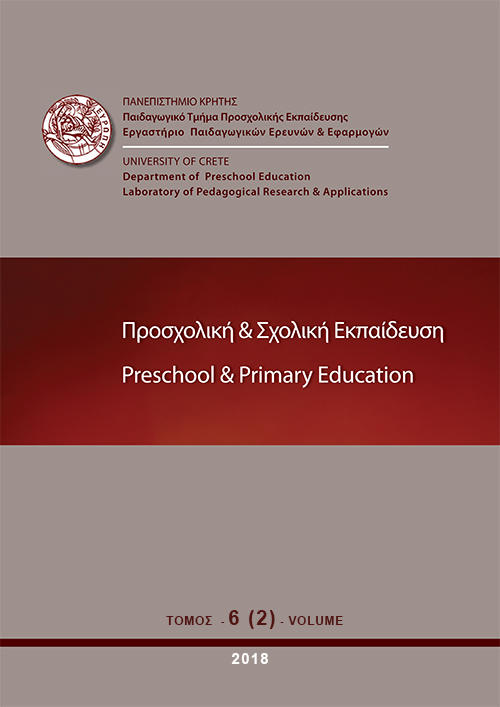Does theatrical play promote social skills development in students with autism? A systematic review of the methods and measures employed in the literature
Περίληψη
This systematic review cites a number of programs and critically analyzes methods and measures used to develop social skills in young students with Autism Spectrum Disorders (ASD). Social skills are interpreted through a ToM theory lens, emphasizing interactions such as understanding, explaining, predicting, and manipulating the behavior of themselves and the others. The aim of this review is to study the role of the theatrical play programs and its effect on social interactions and social skills on students with ASD. An online search through Proquest and First Search resulted in twelve studies of diverse methodologies. All these studies support the value of theatrical play as a means of social skill development. More specifically, the qualitative, as well as the quantitative data, indicate the benefits of these programs on ASD students’ social skills such as cooperation, communication, and social awareness. More longitudinal studies are needed to develop and test pedagogical strategies for social skills development of ASD students in light of theatrical play activities. In addition, studies should be geared towards the teacher’s ability to teach theatrical play and thus promote social interaction between students with and without ASD in integrated school environments. Synchronizing theory with art and cooperative play seems to be the key to answer such assumptions positively.
Λεπτομέρειες άρθρου
- Πώς να δημιουργήσετε Αναφορές
-
Mpella, M., & Evaggelinou, C. (2018). Does theatrical play promote social skills development in students with autism? A systematic review of the methods and measures employed in the literature. Preschool and Primary Education, 6(2), 96–118. https://doi.org/10.12681/ppej.16135
- Τεύχος
- Τόμ. 6 Αρ. 2 (2018)
- Ενότητα
- Άρθρα

Αυτή η εργασία είναι αδειοδοτημένη υπό το CC Αναφορά Δημιουργού – Μη Εμπορική Χρήση – Παρόμοια Διανομή 4.0.
Οι συγγραφείς των άρθρων που δημοσιεύονται στο ΠΡΟΣΧΟΛΙΚΗ & ΣΧΟΛΙΚΗ ΕΚΠΑΙΔΕΥΣΗ διατηρούν τα δικαιώματα πνευματικής ιδιοκτησίας επί των άρθρων τους, δίνοντας στο περιοδικό το δικαίωμα της πρώτης δημοσίευσης. Άρθρα που δημοσιεύονται στο ΠΡΟΣΧΟΛΙΚΗ & ΣΧΟΛΙΚΗ ΕΚΠΑΙΔΕΥΣΗ διατίθενται με άδεια Creative Commons 3.0 και σύμφωνα με την άδεια μπορούν να χρησιμοποιούνται ελεύθερα, με αναφορά στο/στη συγγραφέα και στην πρώτη δημοσίευση για μη κερδοσκοπικούς σκοπούς και με δικαίωμα τροποποίησης μόνον με παρόμοια διανομή (αν αναμείξετε, τροποποιήσετε, ή δημιουργήσετε πάνω στο υλικό, πρέπει να διανείμετε τις δικές σας συνεισφορές υπό την ίδια άδεια όπως και το πρωτότυπο). To Εργαστήριο Παιδαγωγικών Ερευνών και Εφαρμογών του Παιδαγωγικού Τμήματος Προσχολικής Εκπαίδευσης του Πανεπιστημίου Κρήτης και το Εθνικό Κέντρο Τεκμηρίωσης διατηρούν το δικαίωμα να δημοσιεύουν, να αναπαραγάγουν, να παρουσιάζουν στο κοινό, να διανέμουν και χρησιμοποιούν άρθρα που δημοσιεύονται στο ΠΡΟΣΧΟΛΙΚΗ & ΣΧΟΛΙΚΗ ΕΚΠΑΙΔΕΥΣΗ σε οποιοδήποτε μέσο και μορφή είτε μεμονωμένα είτε ως μέρη συλλογικών έργων, για όλο το χρόνο διάρκειας προστασίας της πνευματικής ιδιοκτησίας και για όλες τις χώρες του κόσμου. Αυτό περιλαμβάνει ενδεικτικά και όχι αποκλειστικά, το δικαίωμα δημοσίευσης των άρθρων σε τεύχη του περιοδικού ΠΡΟΣΧΟΛΙΚΗ & ΣΧΟΛΙΚΗ ΕΚΠΑΙΔΕΥΣΗ, αναπαραγωγής και διανομής μεμονωμένων αντιγράφων των άρθρων, αναπαραγωγής ολόκληρων των άρθρων σε άλλη έκδοση του Εργαστηρίου Παιδαγωγικών Ερευνών και Εφαρμογών του Παιδαγωγικού Τμήματος Προσχολικής Εκπαίδευσης του Πανεπιστημίου Κρήτης και του Εθνικού Κέντρου Τεκμηρίωσης και αναπαραγωγής και διανομής των άρθρων ή περίληψης αυτών με χρήση πληροφορικού συστήματος αποθετηρίου.



